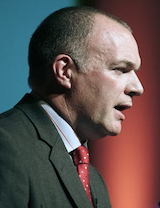 The new world of platform-driven communications takes centre stage at this year's gold standard Comms Vision Convention, and while the growth opportunities are significant, challenges must be overcome to realise the market potential, writes Content Director Paul Cunningham.
The new world of platform-driven communications takes centre stage at this year's gold standard Comms Vision Convention, and while the growth opportunities are significant, challenges must be overcome to realise the market potential, writes Content Director Paul Cunningham.
In May the World Economic Forum predicted the digital economy to return one hundred trillion dollars by 2025, disrupting the known industrial economy in the process. The numbers are mind-boggling, so how do they translate for comms channel businesses that could and should be at the heart of this transition? That will be the focus of our speakers and delegates at Comms Vision 2016, Gleneagles Hotel, November 9-11th.
To become and remain competitive, today's enterprises must design and equip their business to create value, and the concept of a Business Platform can play a critical part in achieving this. A Platform can usefully be thought of as an integrated and open business model, not necessarily a specific technology, that determines how an organisation engages with its stakeholders, promotes technology innovation, designs its business processes and develops an effective culture and brand.
We are currently witnessing the inexorable rise of technology-enabled platforms for businesses, and their corresponding impact on the business communications marketplace is also keenly felt. Emerging software-based platforms for business communications, integrated with common business applications and complemented by new technologies such as sensors, analytics and machine learning, are leading a drive towards contextual communication and are changing the game.
The innate ability to serve the most appropriate communications medium (and supporting information) automatically to an individual or a team according to the real-time context of their location, activity or expertise is already established. In the imminent future this will encompass factors such as our reputation, our health status, proximity to problems or opportunities, or a myriad of other external human and technology factors.
IT TAKES VISION TO BE A LEADER
Comms Vision is the leading annual leadership forum for CEO, MD and CTO delegates representing the premier league of the UK partner community. Places are limited: If you would like to join us this year, please register your interest to attend at www.commsvision.com
Last month Microsoft agreed definitive terms to acquire LinkedIn, the world's biggest professional social media platform for $26 billion, at a premium, making it the third largest acquisition in the history of the tech industry. Notwithstanding the ongoing debate about this valuation and Microsoft's motives, this is clearly a 'Platform' play intended to parlay LinkedIn's 430 million global subscribers (and significant expertise in data analysis) into a value generator across Microsoft's solutions in CRM, Unified Communications and Office Productivity.
Closer to home, Vonage recently spent $230 million on Nexmo, an established but niche communication platform business that most UK comms channel players will be unfamiliar with. Cisco's recent launch of the Spark collaboration platform brings it into this fast expanding territory, with a just-revealed but well advanced API collaboration with Apple bringing it rapidly to the attention of professional smartphone users.
What does this mean to the comms sector and its channel models? Service providers, vendors, system integrators and applications developers must quickly determine their role and opportunity in the new world of platform-driven communications, and they may be facing an existential challenge. This will be decided in the battle to make communications relevant to the customers' current and future workflows and culture, redefining business processes and disrupting markets via innovative business models.
The future will be based on building, buying or borrowing (renting) platforms that customers, partners, suppliers and employees can integrate with and develop on to collaboratively solve business problems. This is having a major impact on established ecosystems and supply chains as they are reconfigured or supplanted, with business leaders recognising the inherent and growing value of being in the platform business.
Traditional vendors such as Cisco and Microsoft are walking a difficult line between partner and competitor by pitching themselves and their more innovative collaborators against their existing service provider customers. Meanwhile, SIs and ISVs have become essential to the building of and access to scarce data management and application development resources. In the ensuing scramble for position, new providers such as Slack and Twillio have emerged, offering opportunistic and agile business solution developers a compelling platform.
How can the channel respond? The comms channel has long been recognised for its ability to sell, assure, bill and deliver business comms solutions. To this can now be added the need to either own development resources or offer access to them, while providing global or regional delivery and support for customers. Channel players must translate customer business requirements into real life solutions with the ability to integrate to multiple platforms. The fundamental service the channel can deliver is network connectivity, with a major part of the opportunity focused on simplifying the often complex and challenging nature of dealing with service providers.
Many channel players identify the provision of ICT services as a natural extension of this current core business and a way of adding new revenue streams, and as these migrate to the cloud new opportunities will emerge. The channel is well positioned to offer cloud services, the performance of which is highly dependent upon a foundation of network availability and quality. However, if they are to be more than just the plumber laying the pipe they must develop and offer relevant bundles for their customers, differentiated by understanding the impact of these on the network and sustaining end-to-end quality of experience from design through deployment and operation.
Although comms solution providers have identified a range of cloud services they can bundle - including enterprise apps, storage, analytics, CRM and billing - according to Ofcom research only 23 per cent of UK SMEs report using cloud services. This leaves considerable headroom for market growth as businesses are educated about the impact of these services on business performance, and as key enablers such as superfast broadband are deployed.
If the key to success in the Platform Age is building a focused but flexible offer based around the needs of customers, the channel has to rapidly develop infrastructure and services that in turn can be quickly adapted for their target markets.
The platform that will support this future must be applicable to a diverse spectrum from consumer to higher end enterprises. This represents a reversal of the traditional industry view where SMEs and consumers were at the foot of the pyramid that always got the attention of the incumbent product development and marketing teams. So what is needed to meet this oncoming opportunity? Three key areas of potential development come to mind:
A Converged Platform: A mix of mobile and fixed services that match the needs of the customers' business is essential. The customer will decide and the platform must be flexible enough to allow mixing and matching of services to fit the business. The channel's ability to offer an optimum blend of networks, devices and applications to improve business performance and save the customer money is a critical success factor.
Cloud: Being alert to the potential impact of cloud-based services on their business and that of their customers (and their networks) is essential to the channel. This will embrace ICT services such as storage and computing as well as UC services and informal contact centres.
Analytics: Data doesn't have to be big to be important. Analytics are not just for the very largest business clients, SMEs can and should benefit from the power of data analytics generated from the core of the network, across service bundles and directly from their existing billing, CRM and operational systems as well as those of their vendor and distribution partners.
So why a Platform again? Digital platforms provide a foundation that others can build on, providing an architecture of participation. The most successful digital businesses have recognised that intrinsic value lies in the network the platform enables, not within the platform alone. The World Economic Forum's digital economy forecast is massive, and every business, even the largest global player, is dwarfed by it. But what if you could plug the power of that network into your business? This is what the Platform concept offers by being highly scalable, applicable to diverse business models, and acting as a sustainable, cost-effective multiplier of inputs and outcomes.
Your customers will require increasingly sophisticated services as they seek to compete with larger or more established businesses, leveraging the digital economy and services available to them from many sources. Comms Vision 2016 promises to play a key part in achieving this.•
IT TAKES VISION TO BE A LEADER
Comms Vision is the leading annual leadership forum for CEO, MD and CTO delegates representing the premier league of the UK partner community. Places are limited: If you would like to join us this year, please register your interest to attend at www.commsvision.com

 Cindy Rose has joined Microsoft UK and will take over UK leadership as Chief Executive Officer from Michel Van der Bel on November 1st. Van der Bel will move into a new role.
Cindy Rose has joined Microsoft UK and will take over UK leadership as Chief Executive Officer from Michel Van der Bel on November 1st. Van der Bel will move into a new role. The new world of platform-driven communications takes centre stage at this year's gold standard Comms Vision Convention, and while the growth opportunities are significant, challenges must be overcome to realise the market potential, writes Content Director Paul Cunningham.
The new world of platform-driven communications takes centre stage at this year's gold standard Comms Vision Convention, and while the growth opportunities are significant, challenges must be overcome to realise the market potential, writes Content Director Paul Cunningham. Communication platforms are centre stage and undergoing constant evolution. Here, we take a behind the scenes look at the technologies that are top of mind for R&D experts.
Communication platforms are centre stage and undergoing constant evolution. Here, we take a behind the scenes look at the technologies that are top of mind for R&D experts. We have reached a seminal moment in the comms channel's history and it's time to take your business, and SME organisations, to the next level. That's the upshot of this year's Margin in Voice and Data event that urged delegates to help UK SMEs build their future on an optimised networked foundation.
We have reached a seminal moment in the comms channel's history and it's time to take your business, and SME organisations, to the next level. That's the upshot of this year's Margin in Voice and Data event that urged delegates to help UK SMEs build their future on an optimised networked foundation. Turning businesses into places fit for today's empowered clients is a matter of complete control over the customer experience. Anything less is a doomed exercise in outdated communications and obsolete work practices, according to Comms Vision Platinum sponsor 8x8 which aims to deliver a consistent and sublime customer experience based on the right technology.
Turning businesses into places fit for today's empowered clients is a matter of complete control over the customer experience. Anything less is a doomed exercise in outdated communications and obsolete work practices, according to Comms Vision Platinum sponsor 8x8 which aims to deliver a consistent and sublime customer experience based on the right technology. The market for hosted telephony is no longer new or emerging and early doubts about its success have become a non-argument, but large numbers of resellers are yet to go hosted. Here, we canvassed the views of some key channel suppliers who urge all resellers to join the hosted telephony rolling campaign convoy.
The market for hosted telephony is no longer new or emerging and early doubts about its success have become a non-argument, but large numbers of resellers are yet to go hosted. Here, we canvassed the views of some key channel suppliers who urge all resellers to join the hosted telephony rolling campaign convoy. A key point of interest noted by MyPhones.com Managing Director Dr Stuart Marsden (pictured left)is the growing number of hosted telephony providers in the market, creating more choice and an environment where resellers can more readily sell to sub-resellers. Alternative options have also emerged such as Skype for Business. Furthermore, prices for hosted are starting to come down and that trend is certain to continue given the increased competition in the market, he believes.
A key point of interest noted by MyPhones.com Managing Director Dr Stuart Marsden (pictured left)is the growing number of hosted telephony providers in the market, creating more choice and an environment where resellers can more readily sell to sub-resellers. Alternative options have also emerged such as Skype for Business. Furthermore, prices for hosted are starting to come down and that trend is certain to continue given the increased competition in the market, he believes. A razor sharp focus on the public sector has given Farnborough-based Skyscape Cloud Services an almighty boost, and that's just the start of a bigger story according to CEO Simon Hansford.
A razor sharp focus on the public sector has given Farnborough-based Skyscape Cloud Services an almighty boost, and that's just the start of a bigger story according to CEO Simon Hansford. Nuvola Distribution is a clear reflection of irresistible market forces, and its Managing Director's character, outlook and drive have been equally shaped by compelling influencing factors - so it's no accident that the combination of Nuvola and Michael Lloyd is a force to be reckoned with.
Nuvola Distribution is a clear reflection of irresistible market forces, and its Managing Director's character, outlook and drive have been equally shaped by compelling influencing factors - so it's no accident that the combination of Nuvola and Michael Lloyd is a force to be reckoned with.